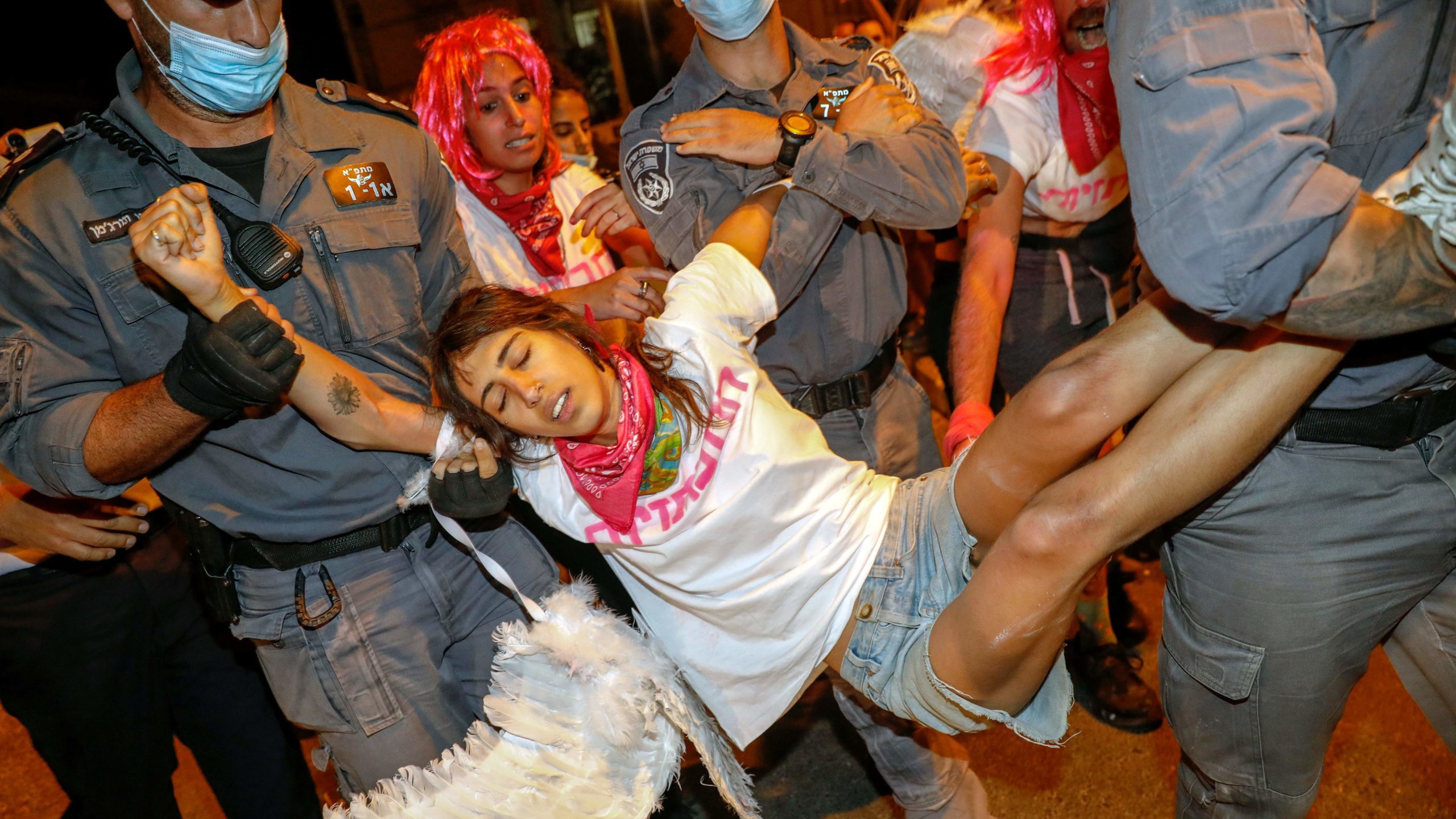Israel Police Ramps Up Security Ahead of Weekend Demonstrations
Protesters promise to protect themselves and fight back if attacked again
Late Thursday evening, Israel braced itself for another volatile weekend as protesters promised to once again flood the streets of Jerusalem and Tel Aviv in their ongoing quest to oust Prime Minister Binyamin Netanyahu from office. Following several violent incidents that have erupted over the past few weeks, mostly between anti-government demonstrators and a handful of the prime minister’s extreme right-wing supporters, police in the capital and near Netanyahu’s private residence in the upscale Caesarea beach town have been reinforced and put on high alert.
Police arrested four men on Wednesday and Thursday, suspected of using glass bottles, clubs and pepper spray to attack peaceful protesters who were marching through the streets of Tel Aviv. Five protesters were injured and two were hospitalized after being stabbed in the neck. Last week, extreme right-wing soccer hooligans assaulted a handful of demonstrators in Jerusalem. Though mostly peaceful, the mass anti-Netanyahu demonstrations have also devolved occasionally into violent confrontations with police and saw minor incidents of vandalism.
Protest organizers now fear a decrease in attendance as a result of the violent attacks against them.
“There is some concern; I’m not sure how much but it’s definitely something I hear from people around me,” says Shikma Bressler, a senior scientist at the Weizmann Institute of Science and one of the founders of the Black Flags protest movement.
Amir Haskel, a retired brigadier general and one of the first to arrive at Netanyahu’s Jerusalem residence in protest months ago, disagrees. “No, I haven’t heard anyone tell me they won’t come [because of the violence],” he told The Media Line. Asked if he fears for his own safety, Haskel replied: “I’m very afraid. Not for myself, but for what may happen to others. I hope I’m wrong but a serious injury [to a demonstrator] is quite possible. The police must be more aggressive in its efforts to separate the two camps.”
In preparation for the weekend rallies, which are expected to draw thousands to Jerusalem, the police announced it would fortify the barriers meant to separate protesters from anti-protesters and enhance other security measures, including the use of technological and human surveillance. Dozens of plainclothes officers will immerse themselves in the crowds, looking out for any mischievous behavior by either side.
I’m very afraid. Not for myself, but for what may happen to others. I hope I’m wrong but a serious injury [to a demonstrator] is quite possible.
For Haskel, that is not enough. “We’ve bought body cameras; we have volunteers who’ll patrol and protect protesters. We’ve even hired a guard to protect the people sleeping in the street during the week [in front of Netanyahu’s official residence],” he says.
Mano, a 24-year-old protester who was arrested last month for disturbing the peace during a rally, told The Media Line he is not fazed by any physical danger. “I hope it won’t [scare people away]. We are not afraid of these hooligans, and we’re going to protect ourselves from these fascists. We’re going to protect our right to protest. Personally, I can’t wait to meet them face to face,” he said, perhaps giving a glimpse into how violent the coming days may become.
We’re going to protect ourselves from these fascists. We’re going to protect our right to protest. Personally, I can’t wait to meet them face to face
Bressler, meanwhile, hopes the police will do enough to prevent any clashes. “We see the police as responsible for our safety. They are the address for keeping us safe, it’s their job and their job alone,” she stresses.
Careful not to put too much blame on the police, Bressler told The Media Line that “evidently, they failed [in Tel Aviv]. Maybe they couldn’t predict exactly what would happen but the fact that all these violent incidents are taking place is proof that they’re not doing enough.”
While initially consisting of a few dozen middle-aged and older protesters, staging quiet sit-ins and polite demonstrations near the Prime Minister’s Residence in Jerusalem, in June and July the gatherings swelled to many thousands of mostly young, much more defiant protesters. The first group, objecting to Netanyahu’s remaining in office while standing trial for corruption charges, eventually made way for the many angry, hopeless, unemployed Israelis, furious at what they see as Netanyahu’s mishandling of the coronavirus and the ensuing financial crisis.
The prime minister himself has accused the entire movement of being orchestrated and funded by political forces aiming to unseat him, including Opposition Leader Yair Lapid and former prime minister Ehud Barak. The protesters themselves, however, deny these charges vehemently, and no proof of any shady backdoor dealings have been presented, as of yet.
“It’s absolutely not true,” rejected Bressler when questioned about the claims. “It’s a grassroots movement – small donations from private people.”
“That’s been Netanyahu’s tactic for years,” laughs Haskel. “There are no organizations that back me. Sure, there are people who want to donate. A bank account was opened; it’s being managed as a trust for us by a lawyer and social activist. Everything is documented.”
I don’t know of anyone who pays me for going out. For every protest that I go to, I pay for gas or the bus ticket. I have no patron
“I don’t know of anyone who pays me for going out,” agrees Mano. “For every protest that I go to, I pay for gas or the bus ticket. I have no patron. It’s a people’s protest, that’s what’s special about it. There are dozens of organizations; there is no one leader. Anyone who’s ever been to one of our demonstrations can see the disorder and spontaneity of it.”


